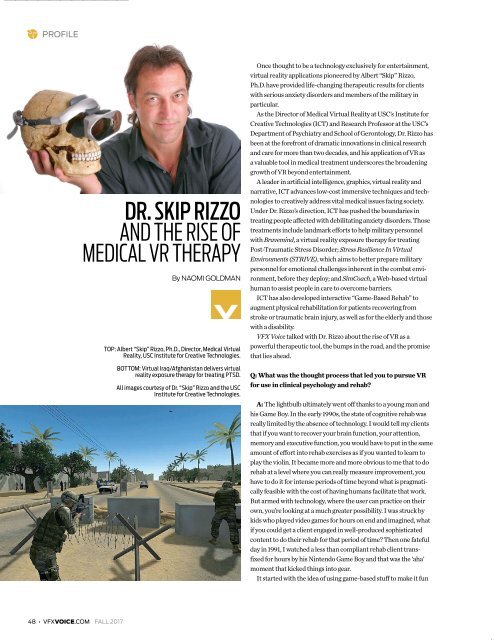You also want an ePaper? Increase the reach of your titles
YUMPU automatically turns print PDFs into web optimized ePapers that Google loves.
PROFILE<br />
DR. SKIP RIZZO<br />
AND THE RISE OF<br />
MEDICAL VR THERAPY<br />
By NAOMI GOLDMAN<br />
TOP: Albert “Skip” Rizzo, Ph.D., Director, Medical Virtual<br />
Reality, USC Institute for Creative Technologies.<br />
BOTTOM: Virtual Iraq/Afghanistan delivers virtual<br />
reality exposure therapy for treating PTSD.<br />
All images courtesy of Dr. “Skip” Rizzo and the USC<br />
Institute for Creative Technologies.<br />
Once thought to be a technology exclusively for entertainment,<br />
virtual reality applications pioneered by Albert “Skip” Rizzo,<br />
Ph.D. have provided life-changing therapeutic results for clients<br />
with serious anxiety disorders and members of the military in<br />
particular.<br />
As the Director of Medical Virtual Reality at USC’s Institute for<br />
Creative Technologies (ICT) and Research Professor at the USC’s<br />
Department of Psychiatry and School of Gerontology, Dr. Rizzo has<br />
been at the forefront of dramatic innovations in clinical research<br />
and care for more than two decades, and his application of VR as<br />
a valuable tool in medical treatment underscores the broadening<br />
growth of VR beyond entertainment.<br />
A leader in artificial intelligence, graphics, virtual reality and<br />
narrative, ICT advances low-cost immersive techniques and technologies<br />
to creatively address vital medical issues facing society.<br />
Under Dr. Rizzo’s direction, ICT has pushed the boundaries in<br />
treating people affected with debilitating anxiety disorders. Those<br />
treatments include landmark efforts to help military personnel<br />
with Bravemind, a virtual reality exposure therapy for treating<br />
Post-Traumatic Stress Disorder; Stress Resilience In Virtual<br />
Environments (STRIVE), which aims to better prepare military<br />
personnel for emotional challenges inherent in the combat environment,<br />
before they deploy; and SimCoach, a Web-based virtual<br />
human to assist people in care to overcome barriers.<br />
ICT has also developed interactive “Game-Based Rehab” to<br />
augment physical rehabilitation for patients recovering from<br />
stroke or traumatic brain injury, as well as for the elderly and those<br />
with a disability.<br />
<strong>VFX</strong> <strong>Voice</strong> talked with Dr. Rizzo about the rise of VR as a<br />
powerful therapeutic tool, the bumps in the road, and the promise<br />
that lies ahead.<br />
Q: What was the thought process that led you to pursue VR<br />
for use in clinical psychology and rehab?<br />
A: The lightbulb ultimately went off thanks to a young man and<br />
his Game Boy. In the early 1990s, the state of cognitive rehab was<br />
really limited by the absence of technology. I would tell my clients<br />
that if you want to recover your brain function, your attention,<br />
memory and executive function, you would have to put in the same<br />
amount of effort into rehab exercises as if you wanted to learn to<br />
play the violin. It became more and more obvious to me that to do<br />
rehab at a level where you can really measure improvement, you<br />
have to do it for intense periods of time beyond what is pragmatically<br />
feasible with the cost of having humans facilitate that work.<br />
But armed with technology, where the user can practice on their<br />
own, you’re looking at a much greater possibility. I was struck by<br />
kids who played video games for hours on end and imagined, what<br />
if you could get a client engaged in well-produced sophisticated<br />
content to do their rehab for that period of time? Then one fateful<br />
day in 1991, I watched a less than compliant rehab client transfixed<br />
for hours by his Nintendo Game Boy and that was the ‘aha’<br />
moment that kicked things into gear.<br />
It started with the idea of using game-based stuff to make it fun<br />
48 • <strong>VFX</strong>VOICE.COM FALL <strong>2017</strong>




